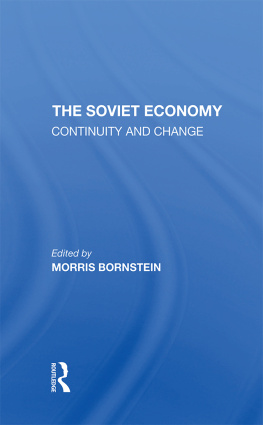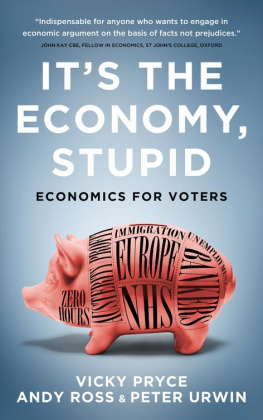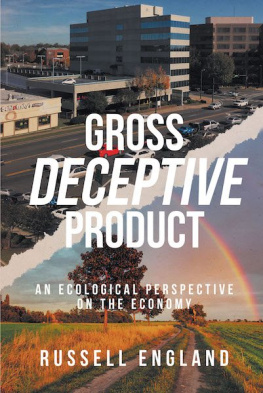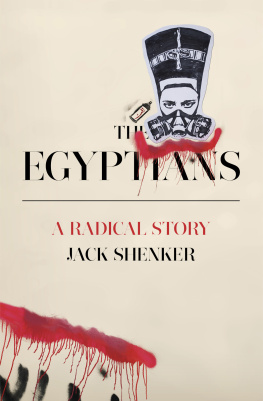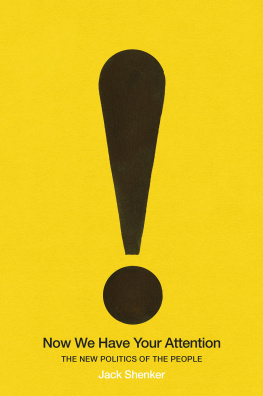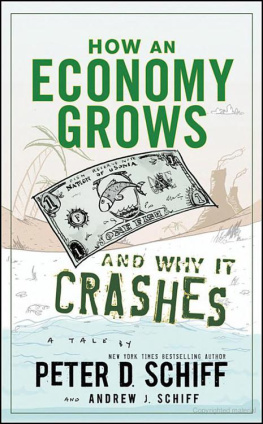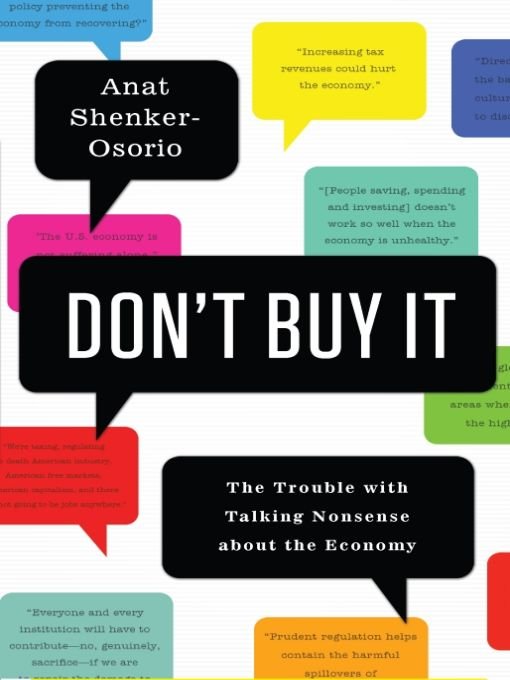Table of Contents
To my fellow Madisonians
Preface
A False Idol
Thou shalt have no other gods before me.
EXODUS 20:3
Many of us are daily left wondering how to make sense of the contradictions we personally experience and hear about the economy. The news tells us the recession ended in 2009, but unemployment has proven stubbornly stable. Pundits contend weve seen the end of the housing bubble, but home prices in most places wont budge and foreclosures continue. Our growth rate has registered positive since the summer of 2009, but poverty levels are also on the rise. Whats going on, what will happen next, and how do we even begin to make sense of the economy?
Im here to save you some boring. Theres no need to actually read long economic treatises, sit through lectures, or decipher expensive textbooks; you dont even have to bother scrutinizing the graphs on the Wall Street Journal business page to learn whats going on right now with the U.S. economy. Its simpler than you think: all you need to know about the economy you can get from cartoonsa single show, in fact.
In their magnum opus, Margaritaville, season 13, episode 3, South Park creators Trey Parker and Matt Stone have done us a service, revealing over the course of twenty-two animated minutes what it might otherwise take several semesters at a decent business school to learn. The episode opens in the small Colorado town of South Park, which is wracked by a sudden and serious economic decline. After a period of collective soul-searching, the locals hit upon the obvious cause of rampant unemployment and plummeting stock values: the Economy is pissed.
The citizens cower upon realizing the truththe Economy is an angry and vengeful God. Because South Parkers have paid insufficient homage to it, the Economy visits ruination and recession upon them. A character lectures a crowd of rapt listeners, There are those who will say the Economy has forsaken us. Nay! You have forsaken the Economy. And now you know the Economys wrath.
The solution in South Park, as will be familiar to modern-day Greeks and low-income Americans, is sacrifice. The cartoon version of this goes full throttle: Bible-inspired acts of piety and prostration ensue. Citizens turn their sheets into togas and cease to buy or sell things altogether in an attempt to show deference before the Economy.
Sacrifice is not an arbitrary or accidental word choice. Its become a hallowed term in our national lexicon, the preferred prescription for achieving propitious economic results. Minus the dead animals and altars, politicians, pundits, and peddlers of conventional wisdom have asked us to sacrifice over and over again. In 2010, Washington Post columnist David Broder wrote that everyone and every institution will have to contributeno, genuinely, sacrificeif we are to repair the damage to our economic health. They may not be asking us to pull on hair shirts or flagellate ourselves with whips, but their high praise of austerity as solution rings sadly true to South Parks notion of Economy as deity.
Deity isnt the only form our economy takes in popular perception. In current discourse about economic policy and in prevailing explanations of events, it has become all too common to treat the economy as a living, breathing, intentional being. One that by all means we should avoid hurting. You can likely recall hearing on TV or reading in the news some variation on We cant do [fill in socially beneficial act] because it will hurt the economy. Or, If we do [thing that will make Americans lives better], it will scare the markets.
In 2011, Representative Jeb Hensarling (R-TX) warned, Increasing tax revenues could hurt the economy. House Speaker John Boehner (R-OH) and Representative Eric Cantor (R-VA) echoed his sentiments in a USA Today op-ed: With nervous markets,... the worst thing Washington can do for our economy is raise taxes on the people we need to start hiring again.
Other things that supposedly give the economy apoplexy? Take your pick: regulations, welfare programs, government spending, helping the poor, raindrops on roses and whiskers on kittens.
But when was the last time you heard a discussion about whether a potential policy might hurt, harm, weaken, or threaten people? Americans like you and me. Instead, weve been taught to be so preoccupied with the abstract fate and feelings of the economy that what happens to us doesnt even enter into the discussion.
Other issues of national concern dont evidence such rhetorical treatment. Military matters, for example, are generally framed as being vital to protecting our national security interests. No one attempts to justify military action because our armies need to grow or because if we dont start a war, some branch of the militarys feelings might be hurt. Military action has to be linked to the good of the American people in any effective sales pitch.
Consider, as another example, how we craft our arguments about education. Whether on the side of vouchers and charters or on the side of unions and addressing disparities, you better believe the people arguing it are characterizing their position as for the children. This phrase is repeated so often it has become a punch line. But the point is, you wont catch anyone insisting that his or her big education reform idea will further the field of pedagogy itself or contribute mightily to our awareness of child development.
But the for the people sales pitch becomes insufficient, or just plain inaudible, whenever talk turns directly to money matters. The American people are admonished to work, consume, and sacrifice to make sure the economy doesnt get grumpy, skittish, or vindictive. In most domains, policies must be advertised as serving our national interests, but when GDP talk rolls around, this is no longer the case. Were here to please the economy, not the other way around.
Our Economy is furthermore billed as a pretty particular deity: an Old Testament style of God. Apparently, insufficient faith in it can catalyze disaster. Economists have a special variable to quantify this kind of belief: its called consumer confidence. We measure it like any other economic indicator; only instead of being an actual tabulation of monies spent, jobs gained, or taxes collected, it tabulates the vague sense of how people feel about what may or may not come to pass.
As well learn in subsequent pages, our monetary high priests readings of the economic Tarot have taken the place of centuries of lived experience, cross-country comparisons, and testable theories. Their say alone can justify policies of austerity and debt reduction peddled to us most often by the right. Youve heard of faith-based social initiatives? Welcome to myth-based economics.
With the Economy established as our overlord, the bankers and CEOs who interpret its omnipotent ways can be seen as its ordained intermediaries, presiding in their too-big-to-fail temples. Simple serfs like you and I hand over tithes and tributes in the form of obscure fees, but frustrated as we may get, we dont dare defy the clergy of finance. No matter how naked their greed and obvious their sins, were scared to topple these people. Without them who would make sense of and pay proper homage to the Economy? The direct line of communication to the almighty dollar is theirs alone.


